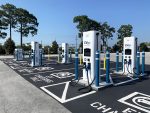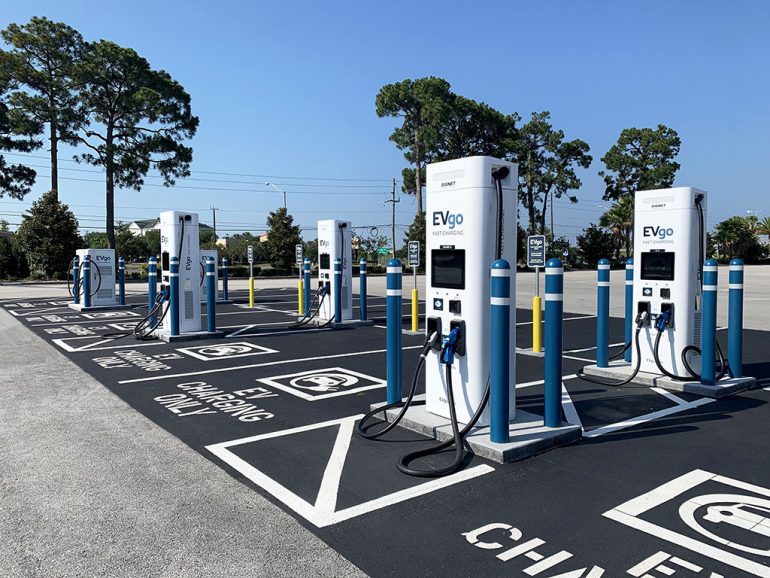Report: Cyberattacks on EV Charging Stations Are Rising


As the adoption of electric vehicles (EVs) accelerates, so does the risk of cyberattacks targeting their infrastructure. A new report from cybersecurity firm Upstream reveals that automotive and smart mobility cyber incidents surged by 39% in 2024 compared to the previous year, with EV charging stations emerging as a growing target for hackers. The report logged 409 cyber incidents in 2024, up from 295 in 2023, and attacks on charging infrastructure now account for 6% of those incidents—an increase from 4% in 2023.
Why Are EV Charging Stations Being Targeted?
The rising number of cyberattacks on EV chargers is tied to their growing connectivity. Modern charging networks rely on cloud-based platforms, mobile apps, and vehicle-to-charger communication, making them attractive targets for hackers looking to exploit vulnerabilities in the system.
According to Upstream, 59% of EV charging-related cyberattacks in 2024 had the potential to affect millions of devices, including chargers, mobile apps, and vehicles. Another 37% could have impacted thousands of devices. The interconnected nature of EV infrastructure dramatically increases the risk, making a single vulnerability capable of triggering widespread disruption.
Hackers have various motives, including:
- Personal data theft: Attackers seek access to sensitive user data stored within charging apps and networks.
- Fraudulent payments: Hackers can reroute drivers to fake payment portals to steal financial information.
- Ransom attacks: Cybercriminals may lock down charging systems and demand payment to restore access.
- Business disruptions: Many attacks lead to service outages, preventing EVs from charging and disrupting mobility.
How Do These Attacks Impact EV Adoption?
With EV adoption on the rise, charging infrastructure reliability is crucial. Nearly three-fourths of attacks on charging stations in 2024 resulted in service or business disruptions, meaning the chargers became non-functional.
“We have issues with adoption, with consumer trust, with range anxiety—this is it, right?” said Upstream’s VP of Marketing, Shira Sarid-Hausirer. If hackers continue to exploit vulnerabilities in charging stations, it could undermine consumer confidence in EVs and slow down the transition to electrified transportation.
The Broader Cybersecurity Concerns in the Auto Industry
EV chargers aren’t the only automotive systems at risk. The industry as a whole has been plagued by security issues, with researchers and white-hat hackers exposing vulnerabilities in brands such as Kia, Ferrari, BMW, Rolls-Royce, and Porsche.
A 2023 Mozilla study found that all 25 car brands it analyzed collected excessive amounts of personal data, often sharing or selling it without giving drivers control. Concerns over data privacy even led U.S. Senators Ron Wyden and Edward Markey to call for an FTC investigation into automakers’ handling of driver data.
EV Chargers and the Power Grid: A Growing Concern
Beyond data security and payment fraud, EV chargers pose another cybersecurity risk: threats to the power grid. Charging stations are directly connected to electrical infrastructure, and researchers have demonstrated that cyberattacks on these systems could have widespread consequences.
A study published in April 2024 by researchers from Concordia University, Hydro-Quebec Research Institute, and George Mason University simulated a “switching attack” on the power grid using EV chargers. Their findings confirmed that such an attack could destabilize the grid, affecting all connected consumers and leading to significant financial losses.
How Can the Industry Address These Cybersecurity Risks?
To prevent cyberattacks on EV charging stations and the broader automotive ecosystem, manufacturers, charging network operators, and regulators must take proactive security measures. Some key steps include:
- Enhanced encryption and authentication to secure communication between chargers, vehicles, and networks.
- Regular software updates and security patches to close vulnerabilities before hackers exploit them.
- Stronger network segmentation to prevent a single compromised charger from affecting an entire system.
- Government regulations and industry standards to ensure cybersecurity best practices are followed.
EV charging infrastructure is a crucial part of the future of transportation, but it also presents a growing cybersecurity challenge. With attacks on the rise, automakers, charging network operators, and policymakers must work together to strengthen security measures and protect both consumers and the power grid. The success of the EV revolution depends not just on battery technology and infrastructure expansion, but also on ensuring that the systems enabling electric mobility are secure, resilient, and trustworthy.



